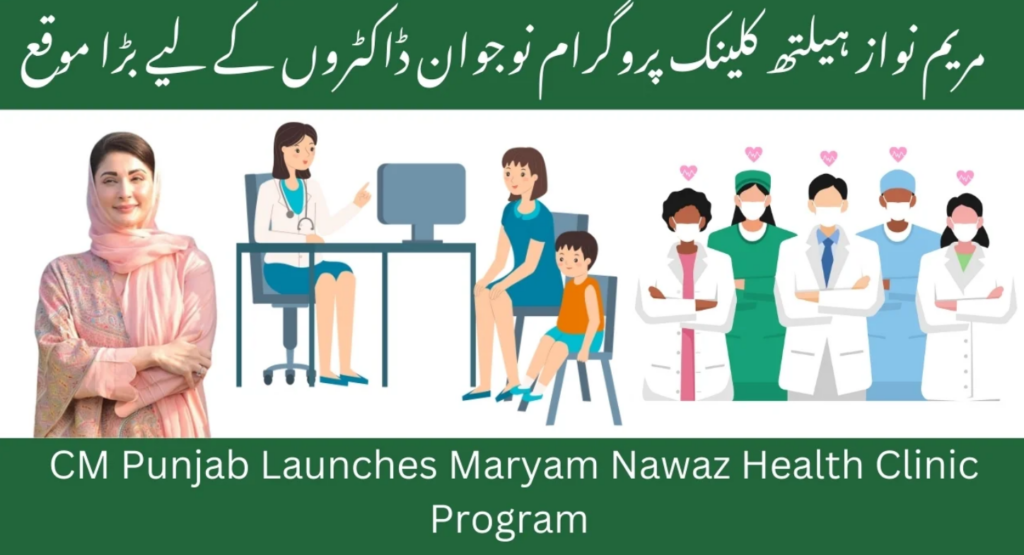The Maryam Nawaz Health Clinic Program is a significant step forward in addressing the healthcare needs of Punjab’s population. With a vision to bridge healthcare gaps, this initiative aims to ensure that everyone in the region has access to essential medical services.
Introduction: A Bold Initiative to Tackle Healthcare Disparities
The Urgent Need for Accessible Healthcare in Punjab
Punjab faces substantial healthcare challenges, including a lack of facilities and trained professionals. Many communities struggle to get basic health services:
- Limited access to physicians and specialists
- High rates of preventable diseases
- Economic barriers to healthcare
The Maryam Nawaz Health Clinic Program: A Detailed Overview
This program seeks to establish health clinics across Punjab, making them community-oriented and accessible. Key features include:
- Establishment of multiple health clinics in underserved areas
- Offering comprehensive medical services at low or no cost
- Focus on maternal, child health, and preventive care
Potential Impact and Challenges Ahead
While the initiative promises to improve health outcomes, challenges remain. Possible hurdles include:
- Ensuring sufficient staffing and training
- Gaining community trust and participation
- Sustaining funding and resources over time
Maryam Nawaz Health Clinic Program Structure and Implementation
Geographic Reach and Target Population
The program will focus on rural and urban underprivileged areas. Target populations include:
- Families living below the poverty line
- Women and children needing specialized healthcare
- Elderly individuals with chronic conditions
Clinic Infrastructure and Staffing
Each clinic will be equipped with essential medical tools and staffed with trained professionals. Key staffing elements will include:
- General practitioners
- Nurses and midwives
- Community health workers
Service Delivery Model and Key Protocols
A streamlined service delivery model will optimize patient care. Important protocols include:
- First-come, first-served appointments
- Preventive screenings and health education programs
- Referral systems for specialized treatments
Services Offered at the Clinics
Primary Healthcare Services Provided
The clinics will offer a variety of primary services, such as:
- Routine check-ups and vaccinations
- Treatment for common ailments
- Maternal and child health services
Specialized Healthcare Services and Referrals
Patients requiring further care will be referred to specialists when necessary. This includes:
- Diagnostic tests (like blood tests, X-rays)
- Chronic disease management programs
- Access to specialists in larger healthcare facilities
Preventive Healthcare Programs and Initiatives
Beyond treatment, clinics will prioritize preventive health measures. These initiatives may include:
- Health education workshops
- Nutrition and lifestyle counseling
- Immunization drives
Funding and Sustainability
Government Allocation and Funding Sources
The Maryam Nawaz Health Clinic Program benefits from governmental financial support, aimed at establishing and running clinics effectively. Funding sources include:
- Allocated budget from provincial health ministries
- Donations from philanthropic organizations
Public-Private Partnerships and Community Involvement
Collaboration with private entities and local communities can enhance service delivery. Benefits include:
- Shared resources and expertise
- Increased outreach efforts
Long-Term Financial Sustainability Strategies
To ensure ongoing operation, the program will explore sustainable funding strategies, such as:
- Establishing fee-for-service models when appropriate
- Engaging community members in fundraising campaigns
Impact Assessment and Monitoring
Key Performance Indicators (KPIs) for Success Measurement
Evaluating the program’s success is crucial. Key performance indicators may include:
- Patient satisfaction rates
- Number of services rendered
- Health outcomes improvement statistics
Data Collection Methods and Reporting Mechanisms
Effective data collection will inform decision-making. Methods include:
- Patient feedback surveys
- Health outcome tracking
- Regular progress reports
Independent Evaluation and Future Improvements
External reviews and audits will help enhance the Maryam Nawaz Health Clinic Program effectiveness. Future adjustments may involve:
- Adapting to community needs
- Updating service offerings based on feedback
Community Engagement and Outreach
Public Awareness Campaigns and Education Initiatives
Awareness campaigns will ensure communities are informed about available services. Strategies include:
- Educational workshops and seminars
- Collaborations with local leaders to spread the word
Community Feedback Mechanisms and Grievance Redressal
A responsive grievance redressal system fosters trust. Feedback channels may consist of:
- Suggestion boxes at clinics
- Regular community meetings
Collaboration with Local NGOs and Healthcare Providers
Partnerships with NGOs and health providers will enhance clinic reach. Benefits include:
- Access to broader resources
- Improved service delivery networks
Ehsaas Kafalat Program Registration 2025: A Comprehensive Guide
Conclusion: Looking Ahead to Improved Healthcare in Punjab
Recap of Key Program Features and Benefits
The Maryam Nawaz Health Clinic Program represents hope for many in Punjab. Key features include:
- Accessible healthcare services
- Focus on preventive care
- Community-orientated approach
Addressing Challenges and Ensuring Maryam Nawaz Health Clinic Program Success
For lasting success, ongoing evaluation and community involvement are essential. Addressing challenges head-on will lead to improved healthcare for all.
The Potential for Replication and Scalability in Other Regions
If successful, this model could inspire similar initiatives in other provinces. The potential for widespread impact is significant, making equitable healthcare a reality across Pakistan.
The launch of the Maryam Nawaz Health Clinic Program is just the beginning. It underscores a commitment to better health for every citizen.

